
- SKEPTIC EPISODE #307 Nicholas Dirks on Science Denial, Distrust, and Skepticism
https://www.skeptic.com/michael-shermer-show/nicholas-dirks-science-denial-distrust-skepticism
comment: here is my two cents worth:- Humans have not changed much over the last 70,000 years when fears about threats from the tribe over the hill were only seconded to fears from threats within our tribe. We certainly didn't think that our campfire might contribute to any existential environmental threat.
- But now we cave people use smart phones, smart televisions, computers and the (anti?) social media layer of the internet to propagate our fears to others. We collectively think we're so damned smart for developing this technology while ignoring the fact that it was developed by a very tiny number of us.
- Artemis: NASA's plan to return humanity to Earth's moon after a 50-year delay
- https://blogs.nasa.gov/artemis/
- NASA is going back to the moon: https://www.youtube.com/watch?v=TMnixOJXN3Q
- Artemis-1 was an unmanned mission similar to Apollo-8 (circumnavigate the moon)
- Artemis-2 will be a manned mission similar to Apollo-8 (circumnavigate the moon)
- Artemis-3 will be a manned mission similar to Apollo-11 (trip to lunar orbit with actual touch down)
- Artemis-? will eventually result in a permanent moon base (perhaps at Shackleton Crater) via Lunar Gateway
- Oops! The Trump Administration recently (2025) made drastic cuts to NASA's budget so it looks like the USA will not be returning to the Moon before 2030 or even 2040. I do not think the American Military will be able to step up as Trump has suggested. Trump's recent feud with Elon Music means that SpaceX will be excluded from consideration. Since returning men to the moon is embedded in China's 5-year and 10-year plans, I do expect that China will accomplish this goal.
- While Apollo was totally funded by the American taxpayer, Artemis is funded by contributions from: USA (NASA), Europe (ESA), Canada and Japan via the Artemis Accords. This is necessary because American politicians of all stripes preferentially, and overwhelmingly, fund the American military at the expense of other government programs. For example, compare the deceptively misnamed Defense budget (US$785 billion in 2022) with the NASA budget (US$24 billion in 2022). I wonder what NASA could do with the money misplaced by the Pentagon. BTW, 785 billion is over half of the annual US budget of 1.5 trillion (American citizens are unaware of the fact that they are living in a contemporary form of feudalism)
- IMHO, manned missions to Mars at this time in human development are a waste of money but the moon is different. Humanity should have established a permanent moon base 40-years ago as envisioned by Wernher von Braun. Recall that humanity's voyages were restricted to the Mediterranean Sea for a thousand years before we ventured out onto the great oceans. The area between Earth and the Moon will be our new Mediterranean for the next hundred years while humanity develops space legs. (and 3-day rescue missions are always possible)
- update-2024-06-28: SpaceX quietly cancelled a moon mission destined to take a Japanese billionaire on an Apollo-8 like mission around the moon. I've heard some recent chatter indicating that Starship is barely able to make it to orbit without any payload, and may require refuelling in orbit in order to go to the moon. If true, then Starship is not even at the Apollo-4 level. How is it that "current SpaceX engineers with laptops" are not able to match "NASA's 1960s engineers with slide-rules"?
- Advanced life in the universe? People have always speculated about intelligent life elsewhere but no one took those thoughts
seriously until Frank Drake published the Drake Equation in 1961 and Carl Sagan began
promoting it 15 years later. Since then, other scientists promoting the Rare Earth
hypothesis provided good reasons why the evolution of advanced intelligent life may only be possible in a solar system with:
- a water and metal-rich rocky planet in the Goldilocks zone
- gravitationally bound to a very large moon for both orbital and rotational stability
- where at least one gas giant can be found in an outer orbit to sweep up asteroids
Conclusion: All this means that life on Earth might be the only precious life that exists anywhere in our galaxy -SO- we had better stop taking Earth's environment for granted -AND- had better stop fighting for foolish things -AND- better stop hoping for better conditions elsewhere where humanity might wish for a do-over. - Contact (1997) ELLIE So who -- what -- are you? TED Originally just another species like yourselves. Well, not like you at all
actually, but... ELLIE Can you show me? TED Small moves, Captain, small moves. ELLIE Why did you contact us? TED You contacted us. We were simply listening. We've been
listening for millions of years. ELLIE And those other docking ports I saw... I mean... there are others? TED Many others. ELLIE And they all travel here through this
wormhole subway system you built. TED Oh, we didn't build it. The transit system has been in place for billions of years; we're just its... caretakers. ELLIE So who...?
TED We don't know. Whoever they were, they were gone long before we ever got here. ELLIE The scale... it's just... (catching her breath) So all the civilizations you
detect; they all end up coming here? TED Not all. Some choose to stay at home and dream their dreams. (sadly) Some never make it this far. ELLIE So we passed some kind
of test? TED You have your mother's hands... (beat) There are no tests, Ellie. We don't sit in judgment. Think of us more as... librarians. Curators of the Universe's
rarest and most valuable creation... And now they are walking through a familiar forest. Sunlight streams through the tall trees. TED As many civilizations as we've
found, compared to the vastness of space... He seems momentarily overcome with a terrible sadness... and then he recovers, smiles. TED ... life is unspeakably rare. So
whenever we do find another civilization, especially one that's... struggling... We send a message. Sometimes we can offer help. Sometimes we can't. But we always try.
Life is simply too precious not to. ELLIE Can you help us? Ted hesitates. They are now standing in the middle of a vast alien desert, stretching to the horizon. The
dome of the sky darkens revealing a view from outside the galaxy; the Milky Way hangs like a pinwheel in the blackness of intergalactic night. TED You're an interesting
species; an interesting mix. Capable of such exquisite dreams; such horrifying nightmares. Technologically you've advanced very quickly -- some think too quickly... and
yet... CLOSE ON TED He turns to Ellie, puts a loving hand to her face. Softly: TED You're so lost. So cut off... and so sad. (transcript from Contact (1997) transcript was lifted from here).
comment: at time reference 1:17:45 the audience sees CNN reporter John Holliman mentioning the public outrage at spending nearly one-third of a trillion dollars on the machine consortium's plan to build a machine to visit the star Vega. Who would have ever imagined that the current annual defense budget of the USA is well over three quarters of a trillion dollars, standing at 812 billion.
- Klaatu's Speech: I am leaving soon and you will forgive me if I speak bluntly. The Universe grows smaller every day and the
threat of aggression by any group anywhere can no longer be tolerated. There must be security for all or no one is secure. This does not mean giving up any freedom
except the freedom to act irresponsibly.Your ancestors knew this when they made laws to govern themselves and hired policemen to enforce them. We of the other planets
have long accepted this principle. We have an organization for the mutual protection of all planets and for the complete elimination of aggression. A sort of United
Nations on the Planetary level. The test of any such higher authority, of course, is the police force that supports it. For our policemen, we created a race of robots
(indicating Gort). Their function is to patrol the planets in space ships like this one and preserve the peace. In matters of aggression we have given them absolute
power over us. At the first sign of violence they act automatically against the aggressor. And the penalty for provoking their action is too terrible to risk. The
result is that we live in peace, without arms or armies, secure in the knowledge that we are free from aggression and war free to pursue more profitable enterprises. We
do not pretend to have achieved perfection but we do have a system and it works. I came here to give you the facts. It is no concern of ours how you run your own planet
but if you threaten to extend your violence, this Earth of yours will be reduced to a burned-out cinder. Your choice is simple. Join us and live in peace. Or pursue
your present course and face obliteration. We will be waiting for your answer. The decision rests with you.
Klaatu - The Day the Earth Stood Still (1951)
Also recently seen in S1E1 of Star Trek: Strange New Worlds - I
just stumbled upon this video from 1985.
It is a Charlie Rose (via CBS) interview of Dr. Isaac Asimov.
Watch this video and realize that Asimov was a very-bright-light intellectual in our dark world.
Everything that Asimov warned about 35-years ago were COLLECTIVELY IGNORED.
He was an uber nerd of the first order (I say this as a complement)
- I just
stumbled upon this video from 1996.
It is a Charlie Rose (via his own web site) interview of Dr. Carl Sagan
This might be the last know interview with Carl who died 6-months later in December 1996. He was an uber nerd of the first order (I say this as a complement)
“There are naive questions, tedious questions, ill-phrased questions, questions put after inadequate self-criticism. But every question is a cry to understand the world. There is no such thing as a dumb question.”Carl Sagan
The Demon-Haunted World: Science as a Candle in the Dark - StarTalk:
Neil deGrasse Tyson reminds us why we celebrate Earth Day
Learn how "a NASA selfie in 1968" and "a moon-landing in 1969" triggered the creation of the EPA (Environmental Protection Agency) and NOAA (National Oceanic and Atmospheric Administration) in 1970 to protect our air and water.
quote: we journeyed to discover the moon but then we discovered the Earth
Laying the ground-work: Winner of 8 awards, Rachel Carson's 1962 book "Silent Spring" is the history making bestseller that stunned the world with its terrifying revelation about our contaminated planet. No science-fiction nightmare can equal the power of this authentic and chilling portrait of the unseen destroyers which have already begun to change the shape of life as we know it. "Silent Spring" is a devastating attack on human carelessness , greed and irresponsibility. It should be read by every American who does not want it to be the epitaph of a world not very far beyond us in time.”
- When I was a teenager in the 1960s, many people (except medical and legal professionals) aspired to be scientists,
engineers, technologists or technicians. It seemed that everyone was reading magazines like Scientific American, Popular Science and Popular Mechanics. A real "can do"
attitude existed everywhere in our society. For example, when President John F Kennedy
announced America's intention to visit the Moon before the end of the decade, naysayers complained that the goal was impossible because the technology did not exist.
Meanwhile, once funding was in place, other "can do" engineers and scientists simply created the technology. Both the internet and "personal computers" are two spin-off
technologies which were never dreamed of by anyone when Kennedy publicly gave his
moon shot speech in 1962 but by the mid 1970s it appeared that everyone was building computer kits (like the Altair 8800 or the Heathkit H8) or were buying personal computers (like
the Apple-2 or the Radio Shack TRS-80).
Within 5 years it seemed that everyone was reading Byte magazine and/or attending
nightly college courses to learn computer programming and/or digital electronics. Life today is much different. It appears to me that life this side
of 1995 is considerably different with many people aspiring to be politicians, political advisors, political aids, or just political pundits with a YouTube channel. The
"can do" attitude has been replaced with a "can't do" political divisiveness with wannabe millionaires calling for taxes cuts and austerity (why should I be expected to
pay for that?). Just at a time when humanity has become dependent upon science and technology, western civilization has decided to replace scientific facts with
political opinion.
Now watch this video: https://www.youtube.com/watch?v=D99qI42KGB0 - Science
is Bigger Than Politics. Neil deGrasse Tyson on The rise (and fall?) of America (from Abraham Lincoln's founding of the National Academy of Sciences in 1863, to
the US currently leading the world in the Nobel Prize count (a third of which we owe to immigrants), America was built on science. What happens when we doubt and defund
it?
Transcript: I have to chuckle a little bit when I'm approached by anybody, but in particular journalists, and say, “Are scientist worried that the public is in denial of science or is cherry-picking it?” And I chuckle not because it's funny but because they're coming to me as a scientist when they should be going to everyone. Everyone should be concerned by this, not just scientists. In fact, scientists will just continue as they're doing. You might withdraw funding, but then there isn't any science done—okay. You are transforming your civilization if you choose to either stand in denial of science or withdraw science funding from those who are actually doing the research. Everything we care deeply about that defines modern civilization pivots on innovations in science, technology, engineering and the math that is the foundational language for it all. Everything: transportation, your health, your communication through smart phones that talk to GPS satellites to find out where Grandma is. To make a left turn to find her address or the nearest Starbucks. Whatever is your need, whatever is your want, the emergent innovations in science and technology are not only enabling it, they are creating for you solutions to challenges you always lived with but never thought that they could be solved. The message is clear: if you do not understand what science is and how and why it works—by the way, I'm not even blaming you. I look back as an educator, I look back to K through 12, kindergarten through 12th grade, and I say there's something missing there. If you, as an educated adult, can say, "This is what these scientists agree to, but I don't agree with them." If that sentence even comes out of your mouth it's like: oh my gosh. Okay, well, we live in a free country, you can say and think what you want. I'm not even going to stop you. But if you rise to power and have influence over legislation and that legislation references what you think science is but is not, that is a recipe for the unraveling of an informed democracy. So I'm not even going to blame you. It's not your fault. Click here to read more - Carl Sagan in 1985 speaking on the topic of Climate Change to the US Congress.
comments: Politicians had all the facts back then but did absolutely nothing about this problem so I wonder if they will ratify anything agreed to at COP26. Let's hope that this quote from Winston Churchill is true: You can always count on Americans to do the right thing - after they've tried everything else.Carl Sagan (last interview - 1996): https://charlierose.com/videos/9094
recent: I just heard some recent news stating that the US Supreme Court has agreed to hear a case, West Virginia v. EPA, challenging the Environmental Protection Agency’s authority to regulate greenhouse gases as pollutants (read more about it here). While it is one thing for US politicians to blame the lack of agreements on China and Russia, the whole world knows the US is one presidential election away from a 180-degree flip as Trump did when he exited the Paris Agreement of COP21. On top of that, many Americans are treating the current world-wide climate crisis the same way they treated the COVID-19 crisis. Many will deny the problem exists at all while others will claim changes will violate their personal freedoms.
- Can
You Say Why America is the Greatest Country in the World?
This fictional interview was first shown on the HBO program The Newsroom back in 2014. The answer was scripted by American writers and everyone you see here is an actor, but it speaks a truth that many modern Americans are unable to see.- Will: It’s not the greatest country in the world, professor. That’s my answer.
- Moderator: You’re saying…
- Will: Yes.
- Moderator: Let’s talk about…
- Will: Fine. [Turns to Sharon] Sharon, the NEA is a loser. Yeah, it accounts for a penny out of our paycheck, but he [gestures to Lewis] gets to hit you with it anytime he wants. It doesn’t cost money, it costs votes. It costs airtime and column inches. You know why people don’t like liberals? Cause they lose. If liberals are so fucking smart, how come they lose so god damn always?
- Sharon: Hey!
- Will: [Turns to Louis] And with a straight face, you’re gonna tell students that America is so star-spangled awesome that we’re the only ones in the world who have freedom? Canada has freedom. Japan has freedom. The UK. France. Italy. Germany. Spain. Australia… Belgium! has freedom… 207 sovereign states in the world, like 180 of ’em have freedom.
- Moderator: Alright…
- Will: [Looks at Jenny] And, yeah, you… sorority girl. Just in case you accidentally wander into a voting booth one day, there are some things you should know. One of them is: There is absolutely no evidence to support the statement that we’re the greatest country in the world. We’re 7th in literacy, 27th in math, 22nd in science, 49th in life expectancy, 178th in infant mortality, 3rd in median household income, number 4 in labor force and number 4 in exports. We lead the world in only three categories: number of incarcerated citizens per capita, number of adults who believe angels are real and defense spending – where we spend more than the next 26 countries combined, 25 of whom are allies. Now, none of this is the fault of a 20-year-old college student, but you, nonetheless, are without a doubt a member of the worst period generation period ever period, so when you ask what makes us the greatest country in the world, I don’t know what the FUCK you’re talking about!… Yosemite? [Stunned silence]
- Will: … It sure used to be. We stood up for what was right. We fought for moral reasons. We passed laws, struck down laws – for moral reasons. We waged wars on poverty, not on poor people. We sacrificed, we cared about our neighbors, we put our money where our mouths were and we never beat our chest. We built great, big things, made ungodly technological advanced, explored the universe, cured diseases and we cultivated the world’s greatest artists AND the world’s greatest economy. We reached for the stars, acted like men. We aspired to intelligence, we didn’t belittle it. It didn’t make us feel inferior. We didn’t identify ourselves by who we voted for in the last election and we didn’t scare so easy. We were able to be all these things and do all these things because we were informed… by great men, men who were revered. First step in solving any problem is recognizing there is one. America is not the greatest country in the world anymore.
- I just heard this on the CBC radio program IDEAS which I publish only
as food-for-thought: Reclaiming Marxism in an Age of Meaningless Work
https://www.cbc.ca/radio/ideas/reclaiming-marxism-in-an-age-of-meaningless-work-1.5175707
comments:
(1) While it is true that Marx published some wacky stuff (the communist manifesto first springs to mind), Marx's description of how capitalism failed Europeans of the 1840s (after the promises made by Adam Smith in the middle to late 1700s failed the common man) sounds very familiar to how extreme capitalism is failing most people today, except the very rich. In Marx's time, he worried that the very rich "didn't ever think about the rest of humanity" and I fear the same is true today. Listen to the program at least once even if you don't agree with everything that is presented. At least you might get a handle on some of the ideas of the economic theory known as Marxism.
(2) For Profit: A History of Corporations (Michael Shermer and William Magnuson): https://www.youtube.com/watch?v=v23eFysjK2o -
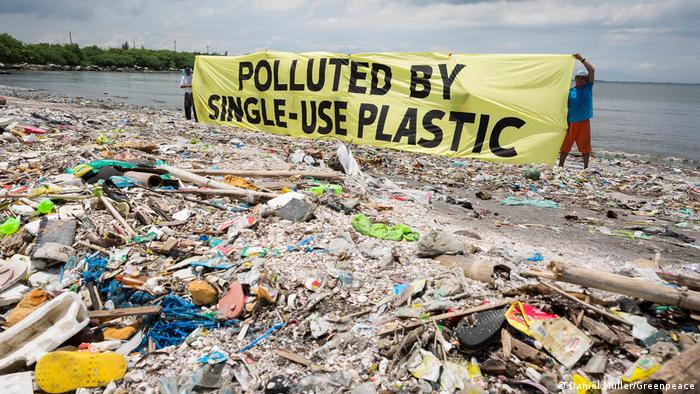 The
European Union announced that they will ban one-time use plastic products by 2021.
The
European Union announced that they will ban one-time use plastic products by 2021.
This includes: stir-sticks, drinking straws, cutlery, soft-drink containers, and shopping bags.
They stated: if something isn't done now, then by 2050 there would be more plastic in the ocean than fish.
Canada announced it will follow Europe's lead and also ban single-use plastics by 2021.
Comments: Most rational people agree that using petroleum (a non-renewable resource) to create single-use plastic products (drinking straws, knives, forks, spoons, coffee cup lids, and cream containers) is wasteful as well as stupid. This is made worse by the fact that less than 9% of all plastic is recycled with the remaining amount going to land fills or, eventually, the ocean. Did you know that those resin identification codes imprinted upon plastic products is almost useless? Numbers "1" and "2" can be easily recycled while numbers "3" through "7" can only be recycled with great difficulty so are usually shipped elsewhere or discarded. So why did those numbers ever get printed? It is all a part of a huge marketing scam to maximize profit - but the misguided souls who made the decision had no idea that their short sighted decision would produce this mess. Now they expect the rest of us to clean it up. Let's start by having the laws changed so that the polluter pays. This generally means "the manufacturer" but until then consumers should just stop buying items vended in plastic.
 Continuing...
Continuing...
- Everyone who has ever been concerned with both good nutrition and exercise will be familiar with powdered protein supplements sold in thick plastic bottles.
Now take a close look at the protein container pictured to the right. This is not a plastic bottle. It is a much lighter, crushable cardboard container employing a thin plastic bag to protect the product inside (too bad they have not yet ditched the black plastic lid). Although the protein is from Bodylogix, the container was manufactured by Ecologic Brands. Click here, here and here to learn more.
- Question: What's wrong with these pictures of two competing toothpaste products? Answer: the second product
employs more waste plastic in the lid which YOU pay for then discard. Suggestion: always buy the product with the smallest ecological foot
print.


 Note: I am not taking
a jab at any individual company or brand here. They ALL sell products in containers with high levels of plastic waste. The plastic waste associated with roll-on
deodorants is much worse (where do all the balls float to?)
Note: I am not taking
a jab at any individual company or brand here. They ALL sell products in containers with high levels of plastic waste. The plastic waste associated with roll-on
deodorants is much worse (where do all the balls float to?)
- More Insanity: Many people drink multiple cups of coffee each day then throw in several creamers each time without giving it any thought. Now you have really got to think about this one: an inexpensive biologically replaceable resource (cow's milk) is served up in a one-time use plastic made from a non-renewable resource (petroleum). Suggestion: until dairy producers move their product into cardboard containers, we must reduce or eliminate the use of plastic creamers.
- Everyone who has ever been concerned with both good nutrition and exercise will be familiar with powdered protein supplements sold in thick plastic bottles.
-
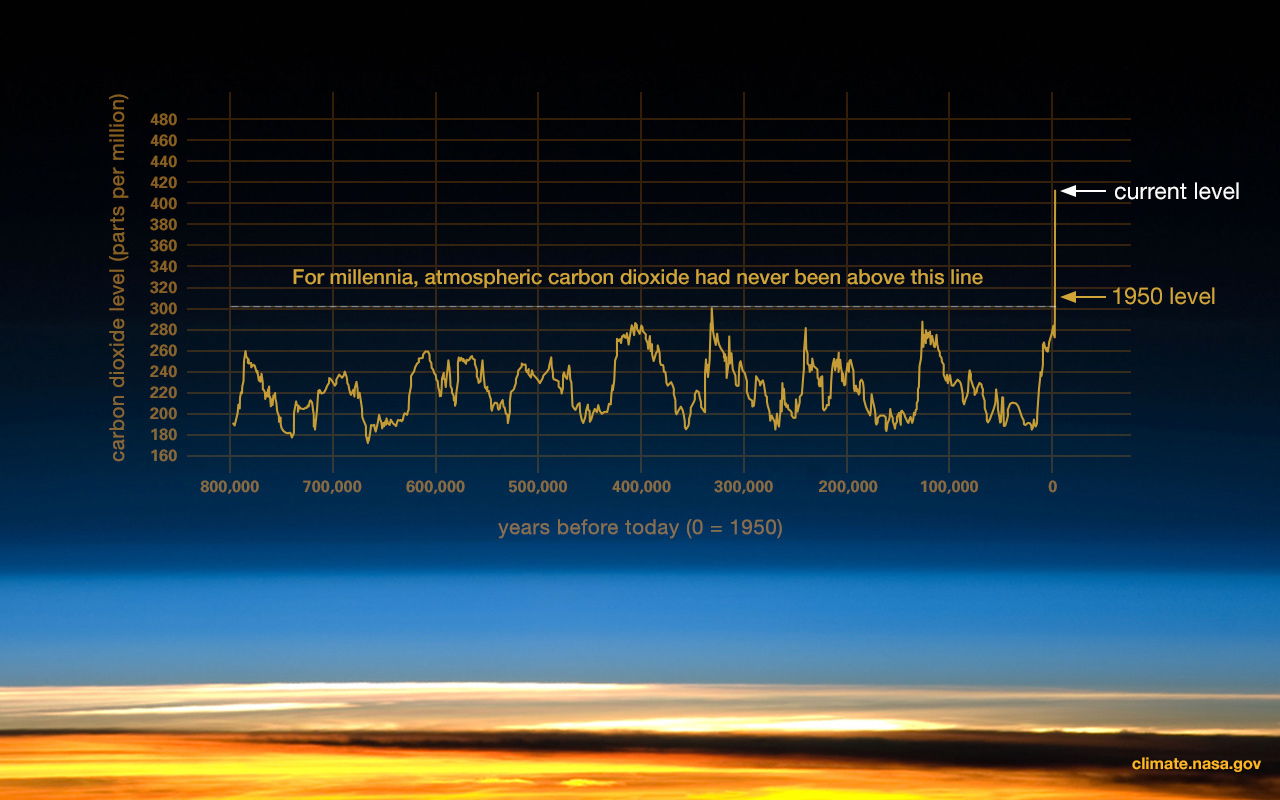 Children born now could live to see the oceans rise well over 1 m (3.2 ft) by 2100. Even conservative forecasts of sea level by 2100 are now rising
above the meter mark for high emission scenarios. The last report from the Intergovernmental Panel on Climate Change in 2013 concluded that sea level could rise between 0.3 and 1 meter by 2100 depending on how much carbon dioxide we emit. Now a study by Tamsin Edwards of King’s College London has added
0.2 meters to the IPCC report. “Our likely range is about 20 centimeters higher” says Edwards. Other studies have come to similar conclusions. In fact, the
IPCC is set to up its projections: according to a leaked version of an upcoming IPCC report, sea level will rise by as much as 1.3 meters by 2100. In the US alone, a
0.9 meter rise in sea level rise would
displace 13 million people. Global average sea level has already risen
around 22-cm (9-in) since 1880. There are three key questions about what happens next: How much higher will the sea rise for a given amount of warming? How fast
will it rise? And will the loss of some
ice sheets become unstoppable once set in motion, as several recent studies suggest? The only way to find out is by looking at the past and using computer models.
But our knowledge of past sea level changes is poor, and computer models of ice sheets are relatively new and crude, so there are huge uncertainties. The 2013 IPCC
estimate of up to 1 meter assumes hardly any contribution from
Antarctica. However, as the report itself acknowledged, many researchers think the unstable West Antarctic sheet could start to lose a lot of ice long before
2100. continued here...
Children born now could live to see the oceans rise well over 1 m (3.2 ft) by 2100. Even conservative forecasts of sea level by 2100 are now rising
above the meter mark for high emission scenarios. The last report from the Intergovernmental Panel on Climate Change in 2013 concluded that sea level could rise between 0.3 and 1 meter by 2100 depending on how much carbon dioxide we emit. Now a study by Tamsin Edwards of King’s College London has added
0.2 meters to the IPCC report. “Our likely range is about 20 centimeters higher” says Edwards. Other studies have come to similar conclusions. In fact, the
IPCC is set to up its projections: according to a leaked version of an upcoming IPCC report, sea level will rise by as much as 1.3 meters by 2100. In the US alone, a
0.9 meter rise in sea level rise would
displace 13 million people. Global average sea level has already risen
around 22-cm (9-in) since 1880. There are three key questions about what happens next: How much higher will the sea rise for a given amount of warming? How fast
will it rise? And will the loss of some
ice sheets become unstoppable once set in motion, as several recent studies suggest? The only way to find out is by looking at the past and using computer models.
But our knowledge of past sea level changes is poor, and computer models of ice sheets are relatively new and crude, so there are huge uncertainties. The 2013 IPCC
estimate of up to 1 meter assumes hardly any contribution from
Antarctica. However, as the report itself acknowledged, many researchers think the unstable West Antarctic sheet could start to lose a lot of ice long before
2100. continued here...
comments:
- according to tide gauges by sea-faring nations, sea level increased by 22 cm (~ 9 in) between 1880 and 2004 which equates to 1.77 mm per year. Radar measurements by weather satellites show the new value as 3.3 mm per year which is double; and this rate appears to be increasing. So even if you do not accept the fact that the rate-of-rise is accelerating, sea level is absolutely guaranteed to rise an additional 33 cm (~ 13 in) in the next 100 years but remember that this rise is vertical. Beaches are sloped which means that tide-surges will make things a lot worse much sooner.
- Ice ages come and go based when CO2 levels naturally bounce between 180 ppm (ice age) vs. 280 ppm (inter-glacial). But humanity's industrial age has pushed CO2 levels more than 140 units past 280 which is pushing "the melting of ice" to a totally new place. Had we known this earlier, then none of us would have built large cities so close to the coast. I fear that Venice Italy stands as a symbol for American cities like New York, San Francisco and Miami to only name three of many.
- In his latest book titled Light of the Stars, astronomer
Adam Frank presents convincing information that variable 'L' in the Drake Equation should be changed from " self destruction
through nuclear war" to " self destruction though climate change". He argues that even if some extraterrestrial civilizations had never
developed nuclear weapons (as humanity did), all would eventually grow to a size where their collective actions would change their climates, and possibly outstrip their
natural resources. This is an extrapolation of the predator-prey model (described in the book) which was previously used to model the collapse of various civilizations
where local people outstripped their resources (
Easter Island, The Mayans, etc.)
comment-1: What does this say about what humanity is currently doing to planet Earth? In the era of mutually assured destruction (MAD), a large number of western citizens advocated for nuclear deescalation because the thought of an accidental conflict seemed too great. Today, many people seem to think that a healthy economy is more important than a healthy biosphere. In fact, many people with financial ties to the old economy are actively working to speed the collapse by denying that the climate is warming or that is is human induced.
comment-2: Many climate deniers do not believe it is possible for modern humans to change Earth's atmosphere. And yet, it was the action of microscopic stromatolites (cyanobacteria) that added oxygen to Earth's atmosphere ~ 3.5 billion years ago. - Computers speak a simple language known as binary. The lexicon is built from digital 0s and 1s, so the
'C' letter at the start of this box would be represented as an elaborate code: '01000011'. The dominance of binary is partly due to computers being built from
transistors, electrical switches that either allow current to flow or not, and nothing in between. These two well-defined states stand in neatly for 0 and 1. But
there’s a newer electrical component on the scene called a memristor (see main story). These devices are becoming
more and more useful in computers built to mimic the brain, and they are plenty more versatile than the transistor. Rather than being simply on or off, they can adopt
several different states of resistance. Last year, researchers led by Vikas Rana at the Peter Grünberg Institute in Jülich, Germany, got a set of memristors
successfully performing calculations in a ternary language, which uses the digital
equivalent of 0s, 1s and 2s. This means memristors could allow computers to compute much more efficiently. And it doesn’t have to stop at base 3; memristors
can reliably adopt at least seven, and possibly more, resistive states.
Continued here: New Scientist (2 August 2017)
Comment: quantum computing (as opposed to quantum communications) is the focus of much research because (entanglement aside) it primarily moves from two digital states (0+1) to three (0-middle-1) but most punters overlook the huge liquid nitrogen cooling tanks. It seems to me that memristor-based technology (with 7 or more states) might be a better candidate for certain applications like neural nets and artificial intelligence. I wonder if memristor technology might be more practical than quantum computing. - Skeptic Magazine ( http://www.skeptic.com/magazine/archives/20.3/
) contains a story about a contest Alfred Russel Wallace entered in 1870 to prove the Earth was
round. (see: https://en.wikipedia.org/wiki/Alfred_Russel_Wallace#Flat_Earth_wager
for a less detailed version of the story)
Every citizen today should read this story paying special attention to the reactions of his opponent, John Hampden, who believed data from Wallace's experiment proved the Earth was flat. Wallace was declared the winner and so won 500 pounds but lost it all in court costs when Hampden would not stop personal attacks while refusing to acknowledge the evidence. Why would the courts allow this? Remember that this occurred in Victorian England at a time where many respectable people were seance-attending spiritualists. I find it difficult to understand that this could happen in the country of Isaac Newton approximately 150 years after Newton's death. The point I am trying to make is this: today's climate change deniers claim to be on the side of Galileo but they are really Flat Earthers -
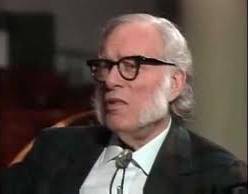 Quote: There is a cult of ignorance in the
United States, and there always has been. The strain of anti-intellectualism has been a constant thread winding its way through our political and cultural life,
nurtured by the false notion that democracy means that "my ignorance is just as good as your knowledge."
Quote: There is a cult of ignorance in the
United States, and there always has been. The strain of anti-intellectualism has been a constant thread winding its way through our political and cultural life,
nurtured by the false notion that democracy means that "my ignorance is just as good as your knowledge."
-- Isaac Asimov (Column in Newsweek, 21 January 1980)
Excerpt from Wikipedia: Isaac Asimov was an atheist, a humanist, and a rationalist. He did not oppose religious conviction in others, but he frequently railed against superstitious and pseudoscientific beliefs that tried to pass themselves off as genuine science. During his childhood, his father and mother observed Orthodox Jewish traditions, though not as stringently as they had in Petrovichi, Smolensk Oblast, Russia; they did not, however, force their beliefs upon young Isaac. Thus he grew up without strong religious influences, coming to believe: "that the Torah represented Hebrew mythology in the same way that the Iliad recorded Greek mythology". So when he was age 13, he chose not to have a bar mitzvah. As some of his books (which include: Treasury of Humor and Asimov Laughs Again) record, Asimov was willing to tell jokes involving: God, Satan, the Garden of Eden, Jerusalem, and other religious topics, expressing the viewpoint that a good joke can do more to provoke thought than hours of philosophical discussion.
comment: I wished Christians (like my parents) shared the same perspective. - Facts, Hypothesis, Theory, Law: Explained! https://www.youtube.com/watch?v=lqk3TKuGNBA
- Facts are observations
- the Sun rises in the morning then sets in the evening
- Hypothesis (hypo-thesis literally means 'below thesis') is a proposed explanation; here are three of many:
- the Sun moves around the Earth (jump to step 3a) in circles
- the Earth moves around the Sun (jump to step 3b) in circles
- all planets, including the Earth, move around the Sun in elliptical orbits (although they all have different elliptical eccentricities)
- Theory is the result of an experimentally tested Hypothesis; at this point a scientist will write, then publish, a thesis
- experimental test of hypothesis 2a...
- passes (until the era of precision measurements) so jump to step 4 to build models (mathematical, mechanical, computer-based, etc.)
- fails during the era of precision measurements (Tycho Brahe) so go back to step 2 to develop hypothesis 2b
- experimental test of hypothesis 2b...
- passes for a time (we have a theoretical understanding of the issue) so jump to step 4
- fails during the era of evermore precise measurements so jump to hypothesis 2c
- experimental test of hypothesis 2a...
- Law is a detailed mathematical description
- develop a model to test the hypothesis with greater precision (early physical models were machines; modern models employ computers)
- many times, a successful theory produces yet-unobserved predictions (eg. Atomic Theory, Quantum, Theory of Gravitation)
- improved observations (new facts) through newer instrumentation may force us back to step 2 (eg. General Relativity morphs into General Relativity)
- Facts are observations
- A.I. has been shifting from an "engineering discipline" (expert systems was
the most visible practical success before IBM's Watson) toward a "cognitive science" discipline for a
while now. This shift has forced researchers to view the human mind from a different perspective. One proposal by Daniel
Kahneman separates the human mind into two abstractly labeled modules colloquially referred to as system-1 and system-2
(abbreviated: S1 and S2). S1 is a high-speed parallel processor evolved for avoiding hungry lions but also handles wrote
intelligence ( what is "2 plus 2" ? ) while S2 is a serial processor which deals with higher level procedural intelligence ( what is "19
times 21" ? )
S2 requires more energy and concentration (not something you want to be doing while being chased by a lion) so idles until activated by S1.
- Example 1
- "S1 immediately engages S2 but fails to pass accurate information to S2 (causing S2 to make an error)"
- Examples 2-5
- "S1 will answer incorrectly without ever engaging S2"
- Example 6
- "S1 immediately engages S2; S2 employs a little algebra to compute the answer then notifies S1; S1 doesn't believe S2 so requests S2 to double-check; S2 repeats the solution then notifies S1; S1 still doesn't believe S2 so requests S2 to perform a detailed rationalization of where S1 had gone wrong"
- Example 7
- "S1 will do a preliminary scan of the facts then will usually give up as soon as it notices one facts is missing; Sometimes S1 will defer to S2 which may dig deeper then make the same mistake; However, sometimes experienced "logicians" or "digital circuit designers" will notice that "since two of three facts were provided" that a possible solution might exist. So those people will reengage S2 to produce the correct answer.
Examples:

- This graphical algebra problem employs picture symbols rather than x, y and z. (answer)
- "All flowers need water. All roses need water. Therefore, all roses are flowers". Is this logically true? (answer)
- A bat and a ball cost $1.10 in total. The bat costs $1 more than the ball. How much does the ball cost? (answer)
- If it takes 5 machines 5 minutes to make 5 widgets, how long would it take 100 machines to make 100 widgets? (answer)
- A lily is placed in a lake. Every day the lilies doubles in number. If it takes 48 days for the lily patch to cover the entire lake, how long would it take for
the patch to cover half of it? (answer)
- Three people check into a hotel room. The clerk says the bill is $30, so each guest pays $10. Later the clerk realizes the bill should only be $25. To rectify
this, he gives the bellhop $5 to return to the guests. On the way to the room, the bellhop realizes that he cannot divide the money equally. As the guests didn't
know the total of the revised bill, the bellhop decides to just give each guest $1 and keep $2 as a tip for himself. Each guest got $1 back: so now each guest only
paid $9; bringing the total paid to $27. The bellhop has $2. And $27 + $2 = $29 so, if the guests originally handed over $30, what happened to the remaining $1? (answer)
- Jack is looking at Anne but Anne is looking at George. Jack is married but George is not. Is a married person looking at an unmarried person? Possible answers
are: "yes", "no", and "cannot be determined" (answer)
- Example 1
-
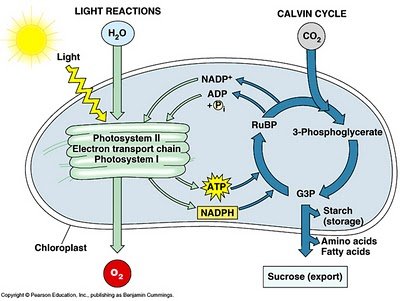 The computed World Human Population Limit
The computed World Human Population Limit
A little math proves the current human population is already too large at 8.0 billion (view current). Anything higher (humanity adds 1 billion every 12 years) is certainly out of the question. Why?
Higher temperatures reduce the efficiency of photosynthesis resulting in a loss of agricultural productivity (biologists estimate a 10% drop for every degree increase). This is a shift in the direction of famine, disease (due to compromised immune systems), war (due to food and water shortages), and death. Since photosynthesis is required to replenish atmospheric O2 (oxygen), then we can expect O2 to drop as well. So I guess it should be no surprise that...
Atmospheric oxygen levels have been dropping ever since measurements began in 1990. While CCS (Carbon Capture and Storage) technologies promise to limit some CO2 releases, any burning of fuel will continue to consume atmospheric oxygen. So when calculating the optimum human population we also need to include the number of large internal combustion engines. (for now, just think about the number of ocean-going boats, jet airplanes, locomotive engines, and one billion functional automobiles). Now for one additional thought...
Many people mistakenly believe higher CO2 levels "are good for plants" and "will trigger plant growth" (some people call CO2 the gas of life). First off, atmospheric CO2 levels have risen from 315 to 420 ppm (an increase of 33%) ever since direct annual measurement began in 1958 but humanity has not noticed any explosion of plant life to compensate for the increase (if we did, we might not have seen an increase in CO2 levels). Secondly, this schematic diagram of photosynthesis shows the first stage involves the photolysis of water by sunlight (this is the only place where oxygen is released to the atmosphere). This diagram is proof that sunlight (input 1) and H2O (input 2) are more important than CO2 (input 3) but each ingredient is considered a limiting factor to maximum photosynthetic productivity (it goes without saying that there is no release of oxygen on short days, cloudy days, or at night). The majority of plant life acquires water through roots rather than the atmosphere. Higher temperatures will evaporate a greater volume of water into the atmosphere making it bio-unavailable to plants. While more evaporation usually translates into more rain fall, higher temperatures will send it back into the atmosphere sooner.
-
 In
1873, while investigating infrared radiation and the element thallium, the eminent Victorian experimenter Sir William Crookes developed a special kind of radiometer,
an instrument for measuring radiant energy of heat and light. Crookes's Radiometer is today marketed as a conversation piece called a
light-mill or solar engine. It consists of four vanes each of which is blackened on one side and silvered on the other. These are attached
to the arms of a rotor which is balanced on a vertical support in such a way that it can turn with very little friction. The mechanism is encased inside a clear glass
bulb where the air has been pumped out to partial vacuum.
In
1873, while investigating infrared radiation and the element thallium, the eminent Victorian experimenter Sir William Crookes developed a special kind of radiometer,
an instrument for measuring radiant energy of heat and light. Crookes's Radiometer is today marketed as a conversation piece called a
light-mill or solar engine. It consists of four vanes each of which is blackened on one side and silvered on the other. These are attached
to the arms of a rotor which is balanced on a vertical support in such a way that it can turn with very little friction. The mechanism is encased inside a clear glass
bulb where the air has been pumped out to partial vacuum.
Observations/Explanations:- When sunlight falls on the light-mill, the vanes turn with the black surfaces apparently being pushed away by the light (is photon momentum being absorbed?)
- In 1901, with a better vacuum pump, Pyotr Lebedev showed that the radiometer only works when there is low pressure gas in the bulb but the vanes stay motionless in a hard vacuum. This is proof that the thermal properties of the low pressure gas are responsible for the motion, not the direct action of photons. Climate-Warming Food-for-thought: too much gas traps too much heat causing the machine to stop working.
- The radiometer can also be made to rotate backwards in a refrigerator.
- Other mistaken explanations for the radiometer: Since the black side of each vane would absorb heat from infrared radiation more than the silver side, then this would cause the rarefied gas to be heated on the black side. In that case, the obvious explanation is that the pressure of the gas on the darker side increases with its temperature, creating a higher force on the dark side of the vane which thus pushes the rotor around. Maxwell analyzed this theory carefully and discovered that, in fact, the warmer gas would simply expand in such a way that there would be no net force from this effect, just a steady flow of heat across the vanes. So this explanation in terms of warm gas is wrong, but even the Encyclopedia Britannica gives this false explanation today. A variation on this theme is that the motion of the hot molecules on the black side of the vane provide the push. Again this is not correct, and could only work if the mean free path between molecular collisions were as large as the container, instead of its actual value of typically less than a millimeter.
- The correct solution to the problem was provided qualitatively by Osborne Reynolds in 1879 in a paper to the Royal Society in which he considered what he called "thermal transpiration". To explain the radiometer, therefore, one must focus attention not on the faces of the vanes, but on their edges. The faster molecules from the warmer side strike the edges obliquely and impart a higher force than the colder molecules. Again, these are the same thermo-molecular forces responsible for Reynolds' thermal transpiration. The effect is also known as thermal creep, since it causes gases to creep along a surface that has a temperature gradient. The net movement of the vane due to the tangential forces around the edges is away from the warmer gas and towards the cooler gas, with the gas passing around the edge in the opposite direction. The behavior is just as if there were a greater force on the blackened side of the vane (which as Maxwell showed is not the case); but the explanation must be in terms of what happens not at the faces of the vanes, but near their edges.
- Baruch Spinoza was a 17th century Dutch Jewish
philosopher (1632-1677).

He was known for his radical views on religion and politics. As a young man, he was banned by his own religious community for his scandalous ideas. He made his living by grinding precision lens for scientists. He died young, at the age of 44, presumably from inhaling glass dust. Spinoza did not believe that God created the heavens and earth per se. For Spinoza, God was equivalent to all of nature. He believed that "false religion" created superstition. A "true religion," on the other hand, was liberating because it allowed freedom of thought. The Europe of 17th century was a place of stifling religious orthodoxies, strife and war. Spinoza believed in freedom of thought and the principle of religious tolerance. Spinoza also had radical ideas about the nature of politics. He believed in democracy. He is credited with helping to shape the revolution in human thought known as The Enlightenment. This program is an introduction to Spinoza's life and thought.
CBC IDEAS host Paul Kennedy explores how Spinoza's thoughts on God, the universe, ethics and politics helped ignite the flame what became known as The Enlightenment.
http://www.cbc.ca/radio/ideas/spinoza-1.2913483 Audio: 53:59 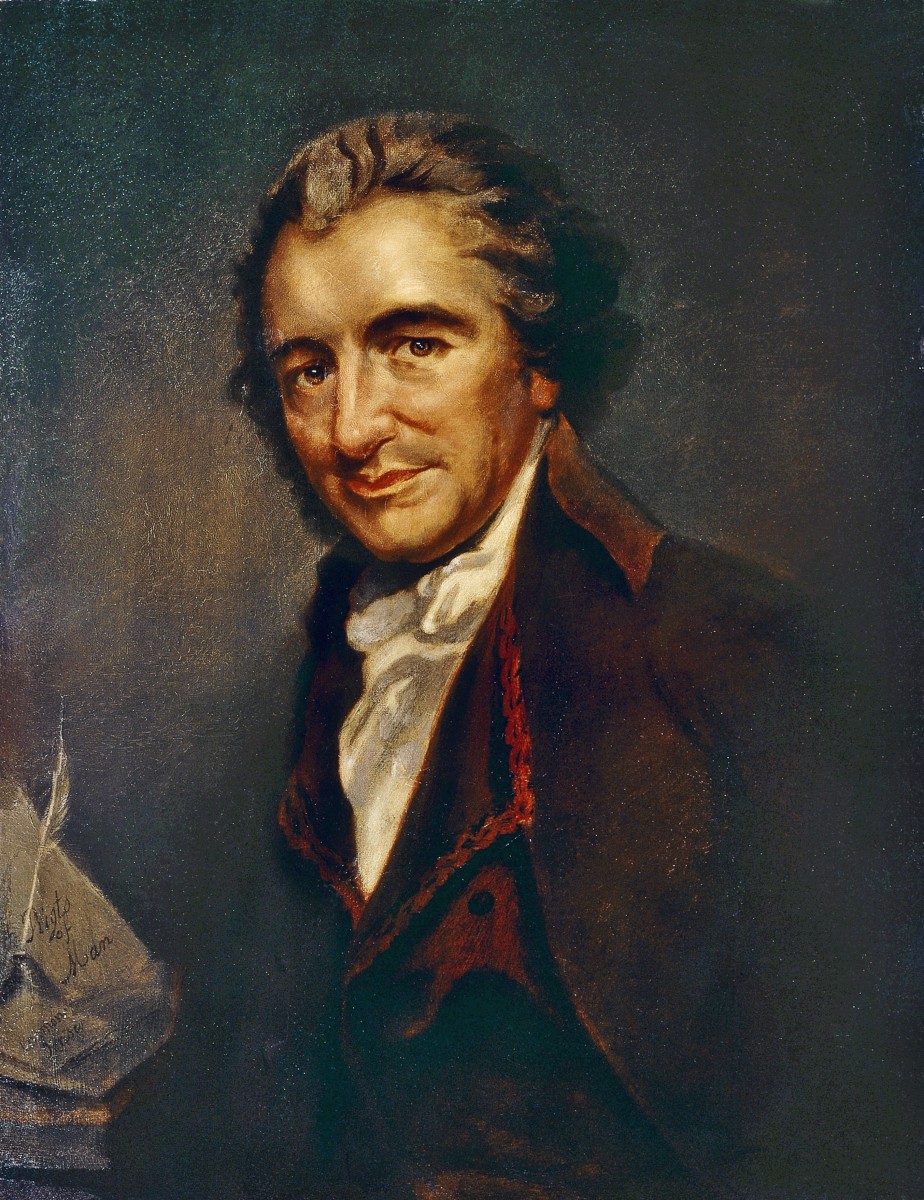 Although many helped to birth the enlightenment
including Spinoza (above), John Locke (1632-1704) and David Hume (1711-1776), Thomas Paine (1737-1809) is the name most
citizens might recognize today. He wrote many things including "the importance of the separation between church and state" and "racial equality" (he proposed
"abolishing slavery 100 years before Lincoln"). The following three book are a "must read" for all modern citizens:
Although many helped to birth the enlightenment
including Spinoza (above), John Locke (1632-1704) and David Hume (1711-1776), Thomas Paine (1737-1809) is the name most
citizens might recognize today. He wrote many things including "the importance of the separation between church and state" and "racial equality" (he proposed
"abolishing slavery 100 years before Lincoln"). The following three book are a "must read" for all modern citizens:
- 1776 Common Sense (American Revolution)
- 1791 Rights of Man (French Revolution)
- 1794 The Age of Reason (Enlightenment).
- Part-1 was written while under arrest in France awaiting the guillotine
- Part-2 was written in 1796
Online resources:- Begin the World Over Again: Thomas Paine and the American Founding (lecture)
- To Begin the World Over Again: The Life of Thomas Paine (DVD)
Local resources:- The Enlightenment
-
- Size differences in two brain structures (the amygdala which is
larger in conservatives and the anterior cingulate which is larger in
liberals) bias human perspective of the world, especially the political world. Therefore:
- Conservatives tend to see issues as "black and white" while liberals tend to see "shades of gray"
- Conservatives play politics as a team sport so will almost always "vote their party" while Liberals will split their vote choosing alternate parties (now you know how Trump got in)
- Conservatives (larger amygdala) are more fearful of others so are more easily encouraged to vote for POPULIST issues like "building the wall" or BREXIT
- funny point: Britain had the lowest number of Syrian immigrants but apparently the highest political reaction against them
- Since conservatives tend to see issues as black and white, they try (and sometimes succeed) in converting liberals over to their way of voting. It seems to me that the reverse never happens
- Click here to learn more
- Size differences in two brain structures (the amygdala which is
larger in conservatives and the anterior cingulate which is larger in
liberals) bias human perspective of the world, especially the political world. Therefore:
